Dawn Renee Stephens's Blog, page 3
April 10, 2023
Burnout from work? Introducing a new children’s book that can help.
Burnout from work is a common issue many people face and can be overwhelming. However, a new children’s book offers a fresh perspective on refueling when feeling burnt out. The book uses the analogy of a potter refilling his vessels to provide helpful insights for managing burnout.
My name is Little Pot. I’m a fruit-bearing vessel created by the potter. You can read my story in the children’s book, The Little Pot. But, if you feel burnout from work, my story is not what you need to hear. Today, I want to tell you about a brand-new book that will be released on May 1, 2023. It’s called Burnout Fit In. This book is about a friend of mine named Oil Lamp. This new children’s book isn’t just for children. If you have burnout from work, it’s for you!
Read more: Burnout from work? Introducing a new children’s book that can help.Understanding Burnout and Its Effects.Burnout is a state of emotional, physical, and mental exhaustion caused by prolonged stress and overwork. It can lead to detachment, cynicism, and a reduced sense of accomplishment. Burnout can also have physical effects, such as headaches, fatigue, and insomnia. It’s essential to recognize the signs of burnout and take steps to manage it before it becomes a serious problem.
 Burnout Fit In explains what will help you if you are burnt out.Introducing “Burnout Fit In” Children’s Book.
Burnout Fit In explains what will help you if you are burnt out.Introducing “Burnout Fit In” Children’s Book.“Burnout Fit In” is a new children’s book that provides a fresh perspective on how to refuel and recharge when feeling overwhelmed by work or other stressors. The book follows the story of “The Oil Lamp.” In this story, the potter creates a tiny oil lamp to shine for the other vessels. Once the little lamp has overcome its fear, the potter places it on a pedestal above us all. Its job must be hard. We all look up to it as it sits atop the lampstand. We didn’t even notice that the oil inside it was running low.
Facing burnout from workIf you are facing burnout from work, chances are people are looking up to you too. You, most likely, are running out of energy and feel lonely and exhausted. In the book, we meet another vessel that is cracked and forgotten. It is sitting amongst the ashes on the floor. Oil Lamp’s light allows us to see the damaged vessel, and the potter picks it up and cleans it. Just as the oil lamp burns out, the potter brings in more oil. Surprisingly, the potter doesn’t fill the oil lamp. Instead, he fills the cracked vessel. He then places it on top of the oil lamp. It is designed to fit in the opening of the lamp. Oil can then seep through the wound of the damaged jar and provide the oil that the lamp needs to keep shining.
Here’s a video where the author, Dawn, shares more about the new book.
The Lessons and Insights from the Story.“Burnout Fit In” offers valuable lessons and insights on how to recover from burnout. The potter represents your creator, and the oil represents the Holy Spirit. You’re facing burnout because you are running low on the power of the Holy Spirit. Prayer and asking God for more energy is a good start. However, you must be prepared for how God will deliver His Spirit to you. In the story, the potter used the wound of another vessel. Therefore, find someone that has been through what you are experiencing. They most likely carry scars and wounds from their experiences. Listen and pray with them. Their wounds will filter the power of the Holy Spirit into your life. Then you will have the energy you need to keep working and shining.
Applying the Lessons so you are not burnout from work.“Burnout Fit In” is an excellent resource for all of us to learn what to do when we feel burnout. The book is available to pre-order now and will help anyone experiencing burnout or looking to prevent it.
You can’t allow burnout to happen because your light can bear fruit. Ephesians 5 describes Christians as children of the light. Additionally, it explains that the fruit of the light consists of all goodness, righteousness, and truth. Likewise, we know that Paul describes the fruit of the Spirit as love, joy, peace, patience, kindness, goodness, faithfulness, and self-control. You are light and fruit-bearers as a Christian because the Holy Spirit lives in you. I’ve seen God produce the fruit of the Spirit in people just as the potter produces strawberries through me. My author, Dawn, explains it in seven steps. I hope you’ll join me on the fruit-bearing journey. We will see how God works in our lives and with those around us. In addition, you’ll receive a short, fruitful Friday email each week. Just type in your email address and name below.
The post Burnout from work? Introducing a new children’s book that can help. appeared first on Creative Teaching Resources and Inspirational Children's Books from Dawn Stephens books.
April 3, 2023
Five ways to let your light shine for Jesus, according to Little Pot
Hello, I’m Little Pot, a fruit-bearing vessel created by the potter. You can read my story in the children’s book, The Little Pot. As God’s vessel, you may seek ways to share your faith and let your light shine for Jesus. Whether you’re a child or an adult, you can follow many practical tips to spread the love and message of Christ. I have five tips to help you.
Read more: Five ways to let your light shine for Jesus, according to Little PotBe humble. Don’t think of yourself as above anyone else.The Bible is full of paradoxes. Things like, “When I am weak, then I am strong,” and “Whoever finds their life will lose it.” If you’re a follower of Christ, you may have experienced that He never takes us on a straight path. It seems we go in one direction to end up in another. I, myself, had to be emptied to feel full. Likewise, most people will tell you that shining happens when you pridefully and confidently lets yourself be known. However, that is not so. To shine for Jesus, we must be humble. Humility is not thinking less of yourself. It is thinking of yourself less.
Consequently, you shouldn’t put yourself above anyone else. Instead, treat everyone with kindness and respect. In the story of Burnout, Fit In, the oil lamp has been placed on a pedestal to shine the potter’s light across the room. Its position is literally above the other vessels. Therefore, it begins to think it is above them mentally too. Regardless of the position our creator places you in, remember that we are all equal in God’s eyes and should love our neighbors as ourselves. By being humble, you can show others the love and grace of Jesus in a powerful way.
 Little Pot shares the first way to shine for Jesus is to be humble. Share your story with others.
Little Pot shares the first way to shine for Jesus is to be humble. Share your story with others.Another way to let your light shine for Jesus is to share your story with others. Everyone has a unique story of how they came to know and love Jesus, and sharing that story can inspire and encourage others. In the children’s book, The Oil Lamp, Tea Pot and I share our stories to give courage to the little lamp. Once we do, the oil lamp feels braver and will hold the potter’s light again. Whether through social media, a blog, or simply talking to someone in person, sharing your story can help others see the power of God’s love and grace in your life. Don’t be afraid to be vulnerable and share your struggles and triumphs. It can help others relate to you and see they are not alone in their struggles. Here’s another blog about your life story. When preparing your story, check out the elements of a good story here.
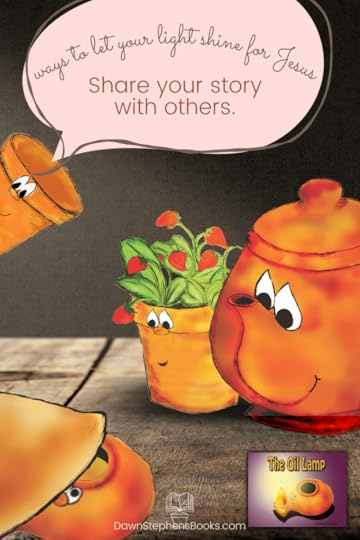 Little Pot shares that a way we shine for Jesus is to share our stories with others.Never hide your imperfections.
Little Pot shares that a way we shine for Jesus is to share our stories with others.Never hide your imperfections.It’s easy to feel like we need to present a perfect image of ourselves to the world, but the truth is that we all have imperfections. We carry mental scars from self-inflicted actions and how others may have treated us. Instead of hiding them, embrace them and use them to show others that it’s okay to be imperfect. Remember, when God is taking you through a rough period, it is to give you the experiences and humility you’ll need to help someone else. In our new book, Burnout Fit In, the cracked jar uses its wound and imperfections to filter oil into the oil lamp. The Holy Spirit can penetrate someone else’s life through the tough experiences you’ve been through. Don’t be afraid to share.
 Little Pot shares that a way we shine for Jesus is never to hide our imperfections.Work together.
Little Pot shares that a way we shine for Jesus is never to hide our imperfections.Work together.One of the best ways to let your light shine for Jesus is to work together with others. The oil lamp could only shine briefly before it faced burnout. It needed the help of the cracked jar. Always remember you can’t shine alone. Whether volunteering at a local charity, joining a church group, or helping a neighbor in need, working together can make a big impact. So don’t be afraid to reach out and collaborate with others to spread the love and kindness of Jesus.
 We need to work together to shine for Jesus.Always be mindful of growing the fruit of the Spirit.
We need to work together to shine for Jesus.Always be mindful of growing the fruit of the Spirit.Did you know that light can bear fruit, just like me?
Ephesians 5 describes Christians as children of the light. Additionally, it explains that the fruit of the light consists of all goodness, righteousness, and truth. Likewise, we know that Paul describes the fruit of the Spirit as love, joy, peace, patience, kindness, goodness, faithfulness, and self-control. You are light and fruit-bearers as a Christian because the Holy Spirit lives in you. I’ve seen God produce the fruit of the Spirit in people just as the potter produces strawberries through me. My author, Dawn, explains it in seven steps. I hope you’ll join me on the fruit-bearing journey. We will see how God works in our lives and with those around us. In addition, you’ll receive a short, fruitful Friday email each week. Just type in your email address and name below.
The post Five ways to let your light shine for Jesus, according to Little Pot appeared first on Creative Teaching Resources and Inspirational Children's Books from Dawn Stephens books.
March 27, 2023
4 Books About Christian Relationships for Kids.
If you want to help your children nurture their faith as individuals and within their relationships, these four must-read picture books on Christian relationships can provide the guidance you need. Through understanding, love, and accountability, each story will remind your kids that they can have a fulfilling relationship with their creator. Likewise, they will discover that their relationships with friends and family have a greater purpose.
The Little PotIn the first book about Christian relationships, we meet a potter and a vessel named Little Pot. This book will teach children (and adults) about the value of patience and the loving omniscience of God. Soon after a potter lovingly forms a new pot and declares that he has significant plans for his creation, the little pot begins to wonder about its purpose. Will it be wise and hold essential papers? Maybe prosperous and hold expensive coins. Or, it might be beautiful and grow flowers. The little pot is cautioned to wait and see as its various expectations prove wrong.
Gradually, Little Pot realizes its creator knows best and has the best plans for it. Readers will recognize that the same is true for them: like the little pot, they were designed to be vessels that bear fruit. Anyone who has ever had trouble seeing God working in their life will realize that, while His work may not always be evident, it is always there. The warm illustrations beautifully enhance this charming allegory about patience and fulfillment. A valuable teaching tool for parents and educators, The Little Pot is a simple yet profound story about inevitable reversals. Many generations will enjoy its timeless message to come.
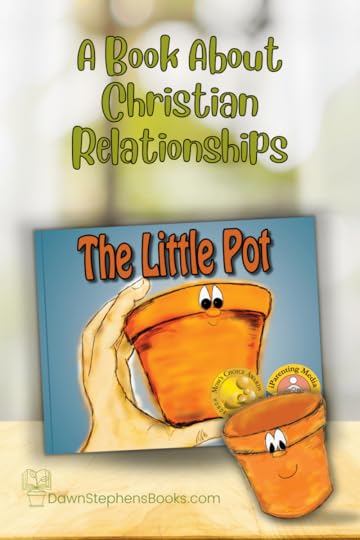 The Little Pot teaches us about a relationship with our creatorThe Tea Pot is 2nd in the books about Christian relationships.
The Little Pot teaches us about a relationship with our creatorThe Tea Pot is 2nd in the books about Christian relationships.After Little Pot discovers it can grow fruit for the potter, it becomes proud. The potter makes another vessel and names it Tea Pot. The relationship between Tea Pot and Little Pot is complicated. Little Pot compares itself to the teapot, wondering if making tea is better than growing fruit. The teapot is selfish and wants to keep the tea that the potter makes inside it. This story also illustrates peer pressure, as Tea Pot convinces Little Pot not to share its fruit. Through this story, we see that Christian relationships can lead us astray too. Ultimately, the vessels realize they need the potter and begin serving him and others.
 The Tea Pot book teaches us about relationships with other Christians as well as our creator.The Oil Lamp.
The Tea Pot book teaches us about relationships with other Christians as well as our creator.The Oil Lamp.Third on the list of books about Christian relationships is The Oil Lamp. Tea Pot and Little Pot watch in this book as the potter makes another vessel named Oil Lamp. It is tiny and shy. The potter fills the little container with oil and gives it a wick. The oil lamp is too scared to shine and hides under a bowl. Eventually, the oil lamp becomes brave and then burns too brightly. The other vessels feel scorched and reject the light of the oil lamp. As readers follow the events, they learn their boldness can turn people away from God.
While the other vessels enjoy destructive behaviors in the darkness, Little Pot and Tea Pot want to help the oil lamp. They show oil lamp love and share their testimonies. Oil Lamp is then ready to shine again. Once the potter reignites the lamp, he places it on a lampstand to give light to all. This book teaches us a lot about how our Christian relationships affect others.
 The Oil Lamp is a book about the importance of Christian relationships.Burnout Fit In
The Oil Lamp is a book about the importance of Christian relationships.Burnout Fit InThe fourth book in our books about Christian relationships is brand new. It will be released on May 1, 2023, and follows Oil Lamp’s journey after it is elevated to a leadership position. Burnout Fit In is a critical story about Christian relationships. You do not have to look hard to find Christian leaders who have shown us toxic relationships. I witnessed this several years ago in the church where I had faithfully served for over twenty-five years. That experience and recent events in the news told me that our Christian institutions have continually elevated pastors and leaders, allowing them to be in positions where they have taken advantage of others.
Christian leadership and toxic relationshipsFor example, The Rise and Fall of Mars Hill was a popular podcast by Mike Cosper. It tells the story of Mark Driscol, an abusive superstar pastor who left many Christians questioning their faith. Likewise, an alarming number of pastors have been charged with abusing children. Additionally, Houston Chronicle and San Antonio Express-News reported that 380 Christian leaders in Southern Baptist Churches faced allegations of sexual misconduct—over 700 victims between 1998 to 2019. Catholic churches were not any better. Therefore, in light of what our world sees as Christian relationships, I felt it was essential to address what can happen if we allow a position or assignment from God to keep us out of healthy Christian relationships.
Loneliness among Christian relationshipsThis book begins where The Oil Lamp book ends. Oil Lamp now serves the potter and shines brightly for the other vessels. The potter elevated it above the different pottery pieces. However, its high location causes it to look down on the others, and over time, it begins to think it is untouchable. As time passes, the Oil Lamp becomes lonely and starts running out of oil. Biblically, oil represents the Holy Spirit. Without the Holy Spirit, Oil Lamp burns out. It looks to the potter for more. However, the potter uses another lonely vessel to refill the lamp.
 Burnout Fit In is a book addressing the relationships with Christian leaders.
Burnout Fit In is a book addressing the relationships with Christian leaders.The vessel he uses is a cracked jar that sits alone among the ashes. Its wound allows the right amount of oil to seep into the lamp. Additionally, the shape of the pot fits in the opening of Oil Lamp. Our creator fills us with the Holy Spirit through the experiences of others. When children (and adults) read this book, they realize that God can use our pain to help others. They also understand that everyone needs healthy Christian relationships.
Christian Relationships are necessary to grow the fruit of the Spirit.Love, joy, peace, patience, kindness, goodness, faithfulness, gentleness, and self-control are cultivated when the Holy Spirit works. God produces this fruit as we surrender to His will for our lives. However, understanding how to become fruit-bearing vessels is a God-sized calling and one of the most important things we do as followers of Christ. Likewise, I’ve seen how God produces the fruit Spirit, and I’ve explained the process in seven steps. I have used these steps with children, teachers, and parents. It includes the three areas of spiritual, social, and academic growth. You’ll become a fruit-bearing vessel and have stronger Christian relationships.
If you join me on this fruit-bearing journey, we will see how God works in our lives and with others around us. In addition, you’ll receive a short, fruitful Friday email each week. Just type in your email address and name below.
 Learn how the potter grows the fruit Spirit Spirit through you.
Learn how the potter grows the fruit Spirit Spirit through you.Disclosure: The Amazon links above are affiliate links, meaning, at no additional cost, I will earn a commission if you click through and make a purchase.
Go here to buy the entire set as a signed copy. Go here to schedule Dawn for a speaking engagement or author visit.
The post 4 Books About Christian Relationships for Kids. appeared first on Creative Teaching Resources and Inspirational Children's Books from Dawn Stephens books.
March 20, 2023
How to manage burnout feeling.
Burnout feeling is a state of mental, physical, or emotional exhaustion. Anyone can experience burnout if they are overwhelmed by fatigue, lack of motivation, and increased irritability. The fruit of the Spirit: love, joy, peace, patience, kindness, goodness, faithfulness, and self-control seem absent during burnout. However, burnout feelings do not need to control you. There is help available, and that help is illustrated in a children’s book called: Burnout, Fit In.
Identify the warning signs of burnout feeling.One of the first steps to successfully tackling burnout is to be aware of the warning signs. Pay attention to physical symptoms such as fatigue, difficulty sleeping, headaches, and loss of appetite. Emotional symptoms include loneliness and isolation. Also, look out for signs such as a lack of motivation, feelings of depression, and disinterest in activities you used to enjoy. If you see any of these warning signs, it’s time to refuel yourself with the Holy Spirit.
Oil is a symbol of the Holy Spirit.In the Bible, Oil is a symbol of the Holy Spirit. The spirit of the Lord came upon me because He has anointed me to preach the gospel to the poor. He has sent me to heal the brokenhearted, to preach deliverance to the captives and recovery of sight to the blind, and to set liberty to those who are oppressed (Luke 4:18).
Likewise, in Acts 10:38, God anointed Jesus of Nazareth with the Holy Spirit and power, who did good and healed all oppressed by the devil, for God was with Him. Because anointing was usually done with oil, we can connect the Holy Spirit to oil in this verse. Additionally, Peter describes the anointing to be “with power.” It is this power that allows us not to feel burnout. The power of the Holy Spirit is what we need to have the right perspective and attitude when we are physically and emotionally drained. Other references to oil and the Holy Spirit can be found here.
 Oil is a symbol of the holy spirit. If we are feeling burnout, we need more oil. That is to say; we need more of the Holy Spirit.Pray and take time to ask God for help.
Oil is a symbol of the holy spirit. If we are feeling burnout, we need more oil. That is to say; we need more of the Holy Spirit.Pray and take time to ask God for help.In Matthew 11:28-30, God reminds us that we can come to him when we are tired and have heavy burdens. If we yoke ourselves to Him, He will give us rest. Remember, God loves us and can help us through tough times. Praying and talking with God can release the Holy Spirit’s power giving us peace, joy, strength, and comfort during times of burnout feeling. Taking time each day to pray, meditate, and seek Him as you deal with your stressors goes a long way. He will help show you the way forward in life.
Remember, you are not alone, and others can help.It can be challenging to process and deal with burnout feeling on your own. You don’t need to go through it alone. Find other Christians to pray with you. Counselors, therapists, and psychologists understand burnout feelings. Therefore, do not be afraid to seek help from health professionals too. Tap into your support network, including family, friends, and community groups, for additional emotional support. Finding someone else who has been through what you are facing will be a big help. Knowing that you are not in this situation alone but have people who care about you and want to help can make working through burnout more manageable.
 God may provide help in unexpected ways. You might get help for the burnout feeling in unexpected ways.
God may provide help in unexpected ways. You might get help for the burnout feeling in unexpected ways.In the book Burnout, Fit In, the oil lamp runs out of oil and faces burnout feelings. It receives oil from an old cracked jar. Likewise, God can provide His Spirit through a person we do not expect. In addition, being ready to follow God is an integral part of the process. We must be ready to release the items, positions, or situations causing stress. Simply put, let go and let God!
The Holy Spirit’s power produces fruit.Love, joy, peace, patience, kindness, goodness, faithfulness, gentleness, and self-control are cultivated when the Holy Spirit works. God produces this fruit as we surrender to His will for our lives. Consequently, we can overcome burnout feeling. However, understanding how to become fruit-bearing vessels is a God-sized calling and one of the most important things we do as followers of Christ. Likewise, I’ve seen how God produces the fruit Spirit, and I’ve explained the process in seven steps. I have used these steps with children, teachers, and parents. It includes the three areas of spiritual, social, and academic growth. In these areas, you’ll become a fruit-bearing vessel.
If you join me on this fruit-bearing journey, we will see how God works in our lives and with others around us. In addition, you’ll receive a short, fruitful Friday email each week. Just type in your email address and name below.
 Learn how the potter grows the fruit Spirit Spirit through you.
Learn how the potter grows the fruit Spirit Spirit through you.Disclosure: The Amazon links above are affiliate links, meaning, at no additional cost, I will earn a commission if you click through and make a purchase.
Go here to buy the entire set as a signed copy. Go here to schedule Dawn for a speaking engagement or author visit.
The post How to manage burnout feeling. appeared first on Creative Teaching Resources and Inspirational Children's Books from Dawn Stephens books.
March 13, 2023
Exploring the Symbolism: What Do Strawberries Represent in the Bible?
What do strawberries represent in the Bible? Symbolism and meaning exist throughout the Bible. Likewise, many readers are often curious about the significance of various fruits and plants mentioned throughout the text. One such fruit is the strawberry, which has a rich history of symbolic meaning in religious and cultural contexts. Therefore, we will explore what strawberries represent in the Bible and their significance to readers.
Read more: Exploring the Symbolism: What Do Strawberries Represent in the Bible?Introduction to symbolism in the Bible.Symbolism in the Bible is an essential component of understanding the deeper meaning of the text from a spiritual and cultural perspective. In our children’s books, the potter and His vessels symbolically represent many biblical truths. You can read more about their stories here. Likewise, by exploring the symbolic representation of objects like fruits and plants, readers can gain insight into the overall values and beliefs during that time. Throughout history, fruits like strawberries convey different messages or ideas, and they are no exception in the Bible. In this post, we’ll discuss what strawberries represent in the Bible and why they hold significant meaning for believers.
Overview of references to strawberries in the Bible and their symbolic meaning.So, what do strawberries represent in the Bible? The Bible does not reference the little red fruit. However, many passages refer to generic fruit that could be a strawberry or strawberry plant. During Bible times, strawberries were symbols of sweetness, love, beauty, and perfection. The way strawberries grow and reproduce with runners is an excellent symbol of Matthew 28:19. Learn more about that idea here.
 Strawberries in the BibleStrawberry symbolism in Christian art, literature, and culture throughout history.
Strawberries in the BibleStrawberry symbolism in Christian art, literature, and culture throughout history.Strawberries represent symbols of virtue, purity, and perfection throughout Christian art, literature, and culture. In medieval Christian paintings, the strawberry symbolizes the Virgin Mary with its perfect shape and red color. Similarly, in literature such as John Bunyan’s “The Pilgrim’s Progress,” the character Christiana compares her love for Christ to the sweetness of a strawberry. Likewise, strawberries have been associated with love and purity in religious traditions throughout history. Some believe that in Song of Solomon 2:1-3, the strawberry is referenced because it symbolizes the sweetness of romantic love. The fruit has also been used to symbolize virtues such as righteousness in various Christian art and literature..
Conclusion on the significance of strawberries as a symbol in the Bible.In conclusion, the biblical symbolism of strawberries centers on themes associated with love and purity. Whether it’s the Song of Solomon’s use of the fruit to symbolize the sweetness of romantic love or Christianity’s representation of strawberries as a symbol of Mary’s purity and perfection, this red fruit has played an essential role in religious traditions throughout history. Its associations with virtues such as chastity and righteousness remain prevalent in religious art and literature today, further cementing its significance as a symbol in the Bible.
Strawberries represent the fruit of the Spirit
Additionally, the biblical symbolism of strawberries should help us understand the process of growing the fruit of the Spirit. The fruit of the Spirit can be produced through anyone that allows God to be their Lord and savior. Understanding how God uses us to produce the fruit of the Spirit can be illustrated through the life cycle of a strawberry. That is why Little Pot and I have developed a seven-step process that will allow the potter to grow love, joy, peace, patience, kindness, goodness, faithfulness, and self-control through you. Just enter your first name and email so we can send you those seven steps. Then you’ll get a fruitful Friday email each week with ways to be even more fruitful!
 Learn how the potter grows the fruit of the Spirit through you.Become a fruit-bearing vessel like Little Pot!
Learn how the potter grows the fruit of the Spirit through you.Become a fruit-bearing vessel like Little Pot!You can purchase signed copies of these books from our store. The books are also available on Amazon.
If you prefer to buy the entire set as a signed copy, go here. If you would like to schedule Dawn for a speaking engagement or author visit, go here.
The post Exploring the Symbolism: What Do Strawberries Represent in the Bible? appeared first on Creative Teaching Resources and Inspirational Children's Books from Dawn Stephens books.
March 6, 2023
Why Self-Control is a Fruit of the Holy Spirit.
If the fruit of the Spirit is when the Holy Spirit manifests itself to produce qualities through us, why is SELF-control on the list? Are we supposed to be controlled by ourselves? What exactly did Paul mean when he finished the list of qualities with self-control? It would appear that it is in direct contradiction with relying on the power of the Holy Spirit. In this post, we will explore why self-control is the final quality within the fruit of the Spirit. Additionally, we’ll discover how to exercise it in our lives.
What is the fruit of the Spirit?The fruit of the Spirit (Galatians 5:22-23) is the substance God grows through us when we allow Him to work in our lives. In these verses, Paul describes the fruit with nine words: love, joy, peace, patience, kindness, goodness, faithfulness, gentleness, and self-control.
Little Pot is a fruit-bearing vessel created by the potter. You can learn more about that story here. The allegory mirrors the relationship that we have with our creator. We are also vessels created to bear fruit. Therefore, in the previous weeks, we studied love, joy, peace, patience, kindness, goodness, faithfulness, and gentleness. This week, we will examine why Paul labeled the fruit with self-control. There is a good reason it comes at the end.
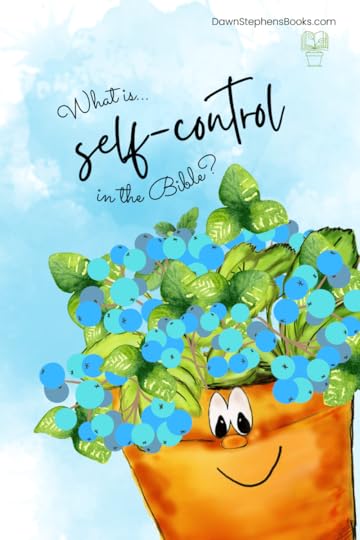 In the Bible, we are to manifest self-control to be like Christ.What is self-control, and why does it matter?
In the Bible, we are to manifest self-control to be like Christ.What is self-control, and why does it matter?Self-control is the ability to restrain impulses, desires, or emotions and instead direct our energies toward healthier and more beneficial behaviors. It involves making decisions based on rational thought rather than impulse and ensuring that our actions align with our values. Practicing self-control is crucial because it allows us to live intentionally, protects us from destructive choices, and is essential to growth and maturity. In the eyes of the world, self-control allows us to live our best life without harming others. But the Bible goes much further. We are to manifest self-control to become like Jesus Christ.
The Bible is not referring to self-control as being controlled by our selfish desires. It is the opposite, having self-control means we have the strength required to produce love, joy, peace, patience, kindness, goodness, faithfulness, and gentleness.
What does the Bible say about self-control?The Bible speaks of controlling our tongues, body, passions, and possessions. In James 3:1-12 we read how difficult it is to control what we say. Likewise, in 1 Corinthians 6:12-20, we learn how important it is to control our bodies. James 4:1-10 and 1 Timothy 6:6-10 remind us that we should control our passions and possessions. We can also find examples of people who had self-control and those who did not. Samson was a person that lacked self-control and suffered for it. In contrast, Daniel showed self-control and the Lord blessed him for it.
Practical steps to embrace self-control through the power of the Holy SpiritTo embrace self-control through the power of the Holy Spirit, we need to understand how He gives us strength. Remaining in an intimate relationship with God, we will learn how He wants us to live out His commands. Additionally, it is essential to remain humble and accountable to fellow Christians as part of our spiritual growth. We should also strive to live our lives for Jesus in everything we do, focusing on keeping our thoughts, words, and actions pure. Additionally, spending time in prayer daily allows us to ask God for His guidance and helps us stay attuned to His will. Finally, reading Scripture helps strengthen our faith because it reminds us of our need for Jesus and offers hope for future victories in our battle for self-control.
Self-control and the fruit of the SpiritLove, joy, peace, patience, kindness, goodness, faithfulness, and gentleness will grow when we exercise self-control. The goal is to make conscious choices that allow God to work through us instead of following our impulses. The right choices aren’t easy, however. They require strength and sacrifice. God’s Spirit will work with us and produce this fruit as we surrender to His will for our lives. Consequently, we can cultivate love, joy, peace, patience, kindness, goodness, faithfulness, gentleness, and self-control. Understanding how to become fruit-bearing vessels is a God-sized calling and one of the most important things we do as followers of Christ. Likewise, I’ve seen how God produces the fruit Spirit, and I’ve explained the process in seven steps. I have used these steps with children, teachers, and parents. It includes the three areas of spiritual, social, and academic growth. In these areas, you’ll become a fruit-bearing vessel.
If you join me on this fruit-bearing journey, we will see how God works in our lives and with others around us. In addition, you’ll receive a short, fruitful Friday email each week. Just type in your email address and name below.
 Learn how the potter grows the fruit Spirit Spirit through you.
Learn how the potter grows the fruit Spirit Spirit through you.Disclosure: The Amazon links above are affiliate links, meaning, at no additional cost, I will earn a commission if you click through and make a purchase.
Go here if you prefer to buy the entire set as a signed copy. Go here if you want to schedule Dawn for a speaking engagement or author visit.
The post Why Self-Control is a Fruit of the Holy Spirit. appeared first on Creative Teaching Resources and Inspirational Children's Books from Dawn Stephens books.
February 27, 2023
The fruit of the Spirit is gentleness. How to be gentle and strong.
The fruit of the Spirit includes gentleness. Likewise, gentleness is often misunderstood as a sign of weakness. However, it is a powerful form of strength. By looking at the fruit of the Spirit—gentleness—as described in the Bible, we can see how it goes hand-in-hand with Paul’s description of this fruit to the church (Galatians 5:22-23).
To begin, let’s reviewThe fruit of the Spirit is love, joy, peace, patience, kindness, goodness, faithfulness, gentleness, and self-control. Little Pot is a fruit-bearing vessel created by the potter. It is given the privilege of growing fruit. You can find the full story here. The allegory mirrors the relationship that we have with our creator. We are also vessels created to bear fruit. The fruit of the Spirit (Galatians 5:22-23) is the substance God grows through us when we allow Him to work in our lives. The verses in Galatians describe this fruit with nine words. Therefore, we studied love, joy, peace, patience, kindness, goodness, and faithfulness in the previous weeks. This week, we will examine what Paul meant by labeling the fruit with gentleness. It takes the strength of God to be truly gentle.
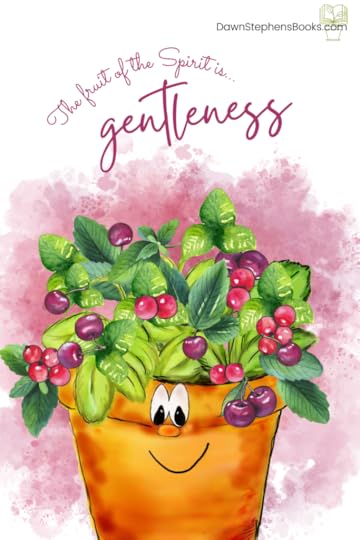 It takes the strength of God to be truly gentle.Understanding true gentleness
It takes the strength of God to be truly gentle.Understanding true gentlenessTo understand gentleness fully, we must look to the Bible, which defines it as “Sensitivity of disposition and kindness of behavior, founded on strength and prompted by love. “We see this exemplified with characters like Job, who endured intense suffering throughout his life yet still responded with humility and understanding. True gentleness is about having a soft heart even amid difficult circumstances—not giving in to feelings of anger, frustration, or bitterness but recognizing our human weakness before God.
It takes the Strength of God to be gentle.We know that it is God who produces the fruit. Therefore, it is essential to remember that being gentle goes against our instinct. For example, when someone accuses us of wrong, our instinct is to immediately defend ourselves with a tone or words that do not come across as gentle. Likewise, when disrespected, we will likely respond with an ungentle spirit. Only through God’s strength can we defend ourselves and gain respect with gentleness. Here are three things that require God’s power and will cultivate gentleness.
The fruit of the Spirit is gentleness – Put others before you.One of the main characteristics of a gentle spirit is selflessness. Being gentle doesn’t mean shying away from difficult conversations or compromising your convictions, but rather cherishing and honoring others by repeatedly placing their needs before yours. Having a gentle spirit doesn’t mean avoiding confrontation; it encourages it. It’s about seeing the perspective that your attitude will have on those around you, speaking with care and integrity, not just power and aggression.
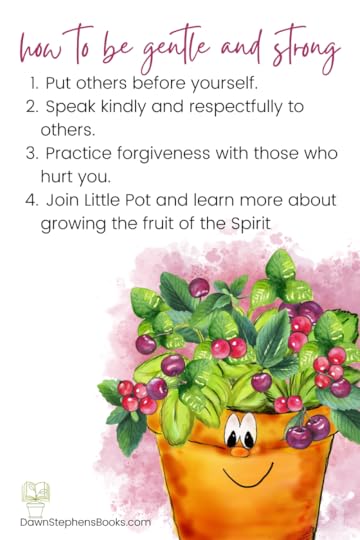 How to be gentle, strong, and grow the fruit of the spirit.The fruit of the Spirit is gentleness – Speak kindly and respectfully to others.
How to be gentle, strong, and grow the fruit of the spirit.The fruit of the Spirit is gentleness – Speak kindly and respectfully to others.An essential part of gentleness is speaking with kindness. Being able to express yourself without belittling others or resorting to aggressive tones shows how strong and confident you are in your character. Instead, use your words thoughtfully and communicate by practicing grace and humility. Speak humbly, using a soft and calming tone, even when tough conversations arise. Respect the feelings of others and take the time to listen as they share their story – it can go a long way!
The fruit of the Spirit is gentleness – Practice forgiveness with those who hurt you.Practicing forgiveness is not an easy task, but it’s crucial to cultivate gentleness within the fruit of the Spirit. It’s easy to hold on to grudges and hurt feelings, but it takes courage, strength, and trust in God to move past those feelings and forgive others who may have wronged you. Take the time to reflect on how you would want to be forgiven if the roles were reversed in a given situation – spending time with God, reading the Bible, and asking Him for strength will start this process of forgiveness.
Gentleness and the fruit of the SpiritLove, joy, peace, patience, kindness, goodness, and faithfulness can grow if we are gentle in our words and actions.
While God’s Spirit is what will produce this fruit, it requires our surrender and participation. Our lives can cultivate love, joy, peace, patience, kindness, goodness, faithfulness, gentleness, and self-control. Consequently, understanding how to become fruit-bearing vessels is a God-sized calling and one of the most important things we do as followers of Christ. Likewise, I’ve seen how God produces the fruit Spirit, and I’ve explained the process in seven steps. I have used these steps with children, teachers, and parents. It includes the three areas of spiritual, social, and academic growth. In these areas, you’ll become a fruit-bearing vessel.
If you join me on this fruit-bearing journey, we will see how God works in our lives and with others around us. In addition, you’ll receive a short, fruitful Friday email each week. Just type in your email address and name below.
 Learn how the potter grows the fruit Spirit Spirit through you.
Learn how the potter grows the fruit Spirit Spirit through you.Disclosure: The Amazon links above are affiliate links, meaning, at no additional cost, I will earn a commission if you click through and make a purchase.
Go here if you prefer to buy the entire set as a signed copy. Go here if you want to schedule Dawn for a speaking engagement or author visit.
The post The fruit of the Spirit is gentleness. How to be gentle and strong. appeared first on Creative Teaching Resources and Inspirational Children's Books from Dawn Stephens books.
February 20, 2023
The fruit of the Spirit is faithfulness. How to cultivate faithfulness.
The fruit of the Spirit includes faithfulness in its list of qualities. Likewise, we need faith to believe in a God we cannot see. In addition, God is always faithful to us. Therefore, let’s examine how we can cultivate faithfulness.
The fruit of the Spirit is love, joy, peace, patience, kindness, goodness, and faithfulness. Little Pot is a fruit-bearing vessel created by the potter. It is given the privilege of growing fruit. You can find the full story here. The allegory mirrors the relationship that we have with our creator. We are also vessels created to bear fruit. The fruit of the Spirit (Galatians 5:22-23) is the substance God grows through us when we allow Him to work in our lives. The verses in Galatians describe this fruit with nine words. Therefore, each week we look at a word from the list and what Paul meant when he explained this fruit to the church.
We studied love, joy, peace, patience, kindness, and goodness in the previous weeks. This week, we will look at Hebrews 11 and consider what Paul meant by labeling the fruit with faithfulness.
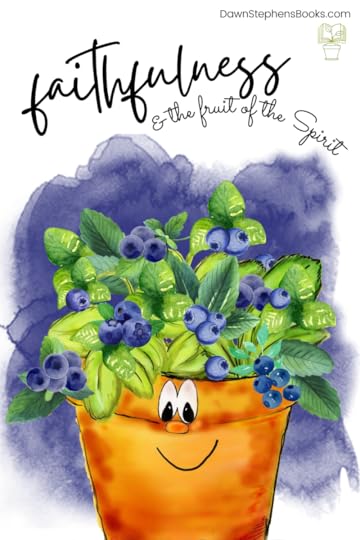 Faithfulness in the BibleFaithfulness in the Bible.
Faithfulness in the BibleFaithfulness in the Bible.Our world defines faithfulness as the quality of being loyal and steadfast. It is to remain loyal to someone or something throughout tough seasons. This definition is in line with what the Bible says about faithfulness. However, as we saw with the other traits of the Holy Spirit, His faithfulness is even broader. Hebrews 11:1 tells us that faith is confidence in what we hope for and assurance beyond what we can see. The chapter then lists examples of people who lived a life full of faith. The list takes us through the Bible’s people and events. As I have studied the list, I identified six ways we can be faithful.
Seek to understandSacrifice and give offerings that please GodTake action without answersTrust God with our childrenGive up comfort and pleasuresObey the crazyBy faith (Hebrews 11)Seek to understand.The list begins at the very beginning, at creation (verse 3). We must seek to understand God spoke the universe into existence. The story of creation has been under attack for centuries. Scientists have tried to discredit the biblical account and get us to doubt Genesis’ version. If you struggle with believing that God created the universe, as scripture explains, I invite you to study what creation scientists have discovered and published in Answers in Genesis. If you are a parent or teacher, I highly recommend their curriculum.
Sacrifice and give offerings that please God.The next item on the list involves what we are willing to sacrifice and offer to God. Do we want to please Him (verse 4)? Abel, a herdsman, gives God an offering that shows faith. He offered the best parts of the firstborn animals from his flock. His brother, Cain, a farmer, made an offering with some of the fruit he grew. God was pleased with Abel’s offering and not Cain’s. Cain’s offering did not require sacrifice. Do we offer God the first portions of our day, time, and money? Do our offerings require sacrifices from us? Giving Him what is easy and convenient does not require faith. Without faith, it is impossible to please God. Enoch lived to please God (verses 5-6).
Take action without answers.Likewise, Noah, Abraham, and Sarah are listed as faithful because they were willing to take action without answers (verses 7-16). Noah built the ark before seeing the flood. Abraham was ready to go to an unknown place. Sarah believed she wasn’t too old to fulfill God’s promise. In each of these scenarios, we see examples of faithfulness. I ask God many questions. Noah, Abraham, and Sarah may have too. However, they took action without knowing the result. In addition, the text points out that they still lived by faith when they died. Even if we do not receive what God promises us on earth, we are to look toward heaven.
Trust God with our children.The fourth item on the list hits home with me. The following examples are all about parenting (verses 17-23). The text lists Abraham’s willingness to sacrifice Isaac. Isaac blessed Jacob and Esau regarding their future. Jacob blessed Joseph’s sons and spoke of the exodus to come. Then, Moses’s parents hid him from Pharoah for three months. Faith plays a big part in raising children. We want to shelter our kids from everything that might hurt them. Yet, trusting God will care for them requires faith.
 Six ways to show faith and be faithful from Hebrews 11Give up comfort and pleasures.
Six ways to show faith and be faithful from Hebrews 11Give up comfort and pleasures.Giving up worldly pleasures also demonstrates faithfulness (verses 24-28). The list includes Moses, not because his parents had faith but because he refused to be known as a son of Pharaoh’s daughter. He gave us the life of a king, left Egypt, and then returned to save God’s people. In contrast, we are sometimes unwilling to give up our life’s comforts to live faithfully.
Obey the crazy.Finally, the last few people on the list are obedient (verses 29-31). And, when I say obedient, I mean they obeyed some crazy ideas. The list includes when the Israelites walked through the red sea and marched around Jericho for seven days. In addition, Rahab broke the law and welcomed spies into her home. We all want to obey God. Yet, our faith is tested when we must do something we cannot understand. Likewise, our obedience makes us faithful. The author of Hebrews then mentions that the list could continue with more biblical examples (verses 32-40).
Where does faith come from?As we describe the events and people in Hebrews 11, it is easy to conclude that faith is acquired through our actions alone. However, we must remember that faithfulness is a part of the fruit the Holy Spirit grows through us. He is the giver of faith. In Romans 12:3, Paul reminds us that God has given each of us a “measure of faith.”
Faithfulness and the fruit of the SpiritLove, joy, peace, patience, kindness, and goodness can grow if we are faithful to God and His word.
While God’s Spirit is what will produce this fruit, it requires our surrender and participation. Our lives can cultivate love, joy, peace, patience, kindness, goodness, faithfulness, gentleness, and self-control. Consequently, understanding how to become fruit-bearing vessels is a God-sized calling and one of the most important things we do as followers of Christ. Likewise, I’ve seen how God produces the fruit Spirit, and I’ve explained the process in seven steps. I have used these steps with children, teachers, and parents. It includes the three areas of spiritual, social, and academic growth. In these areas, you’ll become a fruit-bearing vessel.
If you join me on this fruit-bearing journey, I promise we will see how God works in our lives and with others around us. In addition, you’ll receive a short, fruitful Friday email each week. Just type in your email address and name below.
 Learn how the potter grows the fruit Spirit Spirit through you.
Learn how the potter grows the fruit Spirit Spirit through you.Disclosure: The Amazon links above are affiliate links, meaning, at no additional cost, I will earn a commission if you click through and make a purchase.
Go here if you prefer to buy the entire set as a signed copy. Go here if you want to schedule Dawn for a speaking engagement or author visit.
The post The fruit of the Spirit is faithfulness. How to cultivate faithfulness. appeared first on Creative Teaching Resources and Inspirational Children's Books from Dawn Stephens books.
February 13, 2023
Goodness the fruit of the Spirit – What is goodness in the Bible?
Goodness. The fruit of the Spirit includes goodness in its list of qualities. Likewise, we use this word to describe many different things we like. In addition, the Bible uses it to describe God. Therefore, let’s examine what goodness is in the Bible.
The fruit of the Spirit is love, joy, peace, patience, kindness, and goodness. Little Pot is a fruit-bearing vessel created by the potter. It is given the privilege of growing fruit. You can find the full story here. The allegory mirrors the relationship that we have with our creator. We are also vessels created to bear fruit. The fruit of the Spirit (Galatians 5:22-23) is the substance God grows through us when we allow Him to work in our lives. The verses in Galatians describe this fruit with nine words. Therefore, each week we look at a word from the list and what Paul meant when he explained this fruit to the church.
We studied love, joy, peace, patience, and kindness in the previous weeks. This week, we will consider what Paul meant when he labeled the fruit with goodness.
What is Goodness in the Bible?Google defines goodness as the quality of being morally good or virtuous. We describe many things as being good. It is common to say certain foods taste good or specific scents smell good. We tell our children to “be good” without always explaining what actions we expect from them. The truth is our world defines goodness as actions that benefit ourselves. If we like something, we say it is good. Consequently, we hear phrases such as “Be good to yourself” and “Good for you!”
However, the Bible uses the words good and goodness in the context of the well-being of others. The Greek word for goodness is agathosune, meaning “uprightness of heart and life.” Likewise, the Holy Spirit will give us the power to do things that benefit God and others. We typically live our lives doing what is best for ourselves. However, the fruit of the Spirit puts our selfish desires aside and allows us to act in ways that will help the betterment of God and others. Christ’s life is a perfect example of a life lived with goodness.
Likewise, as Christians, we’ve been taught that no one is good (Psalm 53:1-3 and Romans 3:10). Yet, that is only half of the story. Our lack of being good and doing good is because we allow ourselves to gratify our flesh and not walk in the Spirit (Galatians 5:16). An excellent book that goes into more detail about goodness and, specifically, the Hebrew word TOV is A church called TOV by Scot McKnight. The book is explicitly addressing the culture of our churches today. However, I found part 2 of the book helpful in understanding goodness within the fruit Spirit.
An example of GoodnessGod is faithful to give us His goodness when we ask Him. For example, I can think of a recent situation where God gave me the ability to do what was good for someone else. If you know me, you know that nursing is not something I would ever be good at. Caring for the sick and elderly is not something I enjoy. However, last year my father-in-law went from being a healthy, independent man to needing full-time care at the end of his life. My husband and sister-in-law were the only two left to care for him. Likewise, they were grieving and needed help.
I called on God to fill me with His goodness and give me what I would need to care for him during his last days. When the situation began, I felt utterly unqualified. However, God filled me with the love, joy, peace, patience, and kindness that everyone needed during that time, and it was GOOD! Many would say that death is not good. Yet, I know that my father-in-law was a man ready to meet Jesus. His death was a sweet time that was filled with God’s goodness. I share more of that experience here.
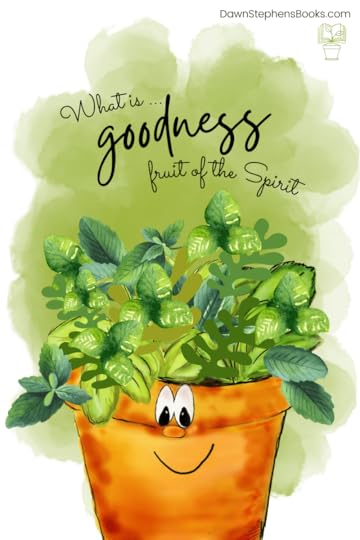 Goodness is described in the Bible as something we receive from God.The fruit of the Spirit verses
Goodness is described in the Bible as something we receive from God.The fruit of the Spirit verses Let’s read some Bible verses about Goodness.
Every good thing given and every perfect gift is from above, coming down from the Father of lights. James 1:17
Do not be overcome by evil, but overcome evil with good. Romans 12:21
The Lord is good, a refuge in times of trouble. He cares for those who trust in him. Nahum 1:7
The Lord is righteous in all his ways and faithful in all he does. Psalm 145:17
Love must be sincere. Hate what is evil; cling to what is good. Romans 12:9
“I have the right to do anything,” you say—but not everything is beneficial. 1 Corinthians 10:23
Neither do people light a lamp and put it under a bowl. Instead, they put it on its stand, and it gives light to everyone in the house. In the same way, let your light shine before others, so that they may see your good deeds and glorify your Father in heaven. Matthew 5:15-16
For this very reason, make every effort to add to your faith goodness; and to goodness, knowledge; and to knowledge, self-control; and to self-control, perseverance; and to perseverance, godliness; and to godliness, mutual affection; and to mutual affection, love. 2 Peter 1:5-7
Trust in the Lord and do good; dwell in the land and enjoy safe pasture. Psalm 37:3
God is able to bless you abundantly, so that in all things at all times, having all that you need, you will abound in every good work. 2 Corinthians 9:8
Turn from evil and do good; seek peace and pursue it. Psalm 34:14
Then you will understand what is right and just and fair—every good path. Proverbs 2:9
Do not be misled: “Bad company corrupts good character.”1 Corinthians 15:33
He gave himself to redeem us from all wickedness and to purify for himself a people that are his very own, eager to do what is good. Titus 2:14
Consequently, God’s definition of goodness is more profound than our ideas of what is good. He was willing to humble himself and become a man for us. He gave all of himself, even facing the gruesome death of the cross (Philippians 2:6-11). This sacrificial act is the goodness that His Spirit can grow in us. We can forgive the unforgivable and sacrifice our desires for those of others when we allow God to produce His fruit through us.
The fruit Spirit is goodness.Love, joy, peace, patience, and kindness can continue to grow when we begin to comprehend the goodness of God.
While God’s Spirit is what will produce this fruit, it requires our surrender and participation. Our lives should cultivate love, joy, peace, patience, kindness, goodness, faithfulness, gentleness, and self-control. However, understanding how to become fruit-bearing vessels is a God-sized calling and one of the most important things we do as followers of Christ. Likewise, I’ve seen how God produces the fruit Spirit, and I’ve explained the process in seven steps. I have used these steps with children, teachers, and parents. It includes the three areas of spiritual, social, and academic growth. In these areas, you’ll learn practical things to do. Consequently, you will be a fruit-bearing vessel.
If you join me on this fruit-bearing journey, I promise we will see how God works in our lives and with others around us. In addition, you’ll receive a short, fruitful Friday email each week. Just type in your email address and name below.
 Learn how the potter grows the fruit Spirit Spirit through you.
Learn how the potter grows the fruit Spirit Spirit through you.Disclosure: The Amazon links above are affiliate links, meaning, at no additional cost, I will earn a commission if you click through and make a purchase.
Go here if you prefer to buy the entire set as a signed copy. Go here if you want to schedule Dawn for a speaking engagement or author visit.
The post Goodness the fruit of the Spirit – What is goodness in the Bible? appeared first on Creative Teaching Resources and Inspirational Children's Books from Dawn Stephens books.
February 6, 2023
The fruit of the spirit is kindness. Advice from the Bible on kindness
The fruit of the Spirit is love, joy, peace, patience, and kindness. Little Pot is a fruit-bearing vessel created by the potter. It is given the privilege of growing fruit. You can find the full story here. The allegory mirrors the relationship that we have with our creator. We are also vessels created to bear fruit. The fruit of the Spirit (Galatians 5:22-23) is the substance God grows through us when we allow Him to work in our lives. The verses in Galatians describe this fruit with nine words. Therefore, each week we look at a word from the list and what Paul meant when he explained this fruit to the church.
We studied love, joy, peace, and patience in the previous weeks. In addition, click here to see how to explain love to children. This week, we will consider what Paul meant when he labeled the fruit of the Spirit with kindness.
Kindness: a movement, a day, a trendGoogle defines kindness as being friendly, generous, and considerate. In the past few years, kindness has become a movement encouraging people to pay it forward and do kind acts for others. There are entire websites devoted to the idea. You can find school programs dedicated to kindness and all types of groups, including a bicycling group.
We have even created a kindness day. (It is November 13th, if you were wondering). Wikipedia explains the movement and history of the day here. According to the Hindustan Times, this day reinforces that compassion links us all together and has the power to bring nations together. The power to bring nations together? Wow! that is a tall order for one little word.
It was not til recently that kindness became a revolutionary trend that we celebrate by buying strangers coffee at Starbucks or painting rocks for strangers to find. Don’t get me wrong; I think focusing on acts of kindness is great. But I believe our efforts can leave out the source. In addition, Josh Wilson even wrote about it in a song.
Bible on KindnessThe fruit of the Spirit is kindness. That means God’s Spirit, and God, Himself, is kindness. We’ve learned in previous weeks that this fruit is not something we can produce without God’s divine intervention. Therefore, when we think of kindness toward ourselves and others, we must realize that it is impossible without God. The Bible has a lot to say about it.
 The Bible has a lot to say about kindness.
The Bible has a lot to say about kindness.
“Be kind and compassionate to one another, forgiving each other, just as in Christ God forgave you.” -Eph. 4:32
“Love is patient and kind; love does not envy or boast; it is not arrogant or rude.” -1 Cor. 13:4
“But love your enemies, and do good, and lend, expecting nothing in return, and your reward will be great, and you will be sons of the Most High, for he is kind to the ungrateful and the evil.” – Luke 6:35
“Put on then, as God’s chosen ones, holy and beloved, compassionate hearts, kindness, humility, meekness, and patience, bearing with one another and, if one has a complaint against another, forgiving each other; as the Lord has forgiven you, so you also must forgive.” – Col. 3:12-13
Consequently, God’s definition of kindness includes forgiveness. We aren’t just supposed to be kind to friends and strangers. God includes our enemies in the list. Likewise, we are to be kind to those that we disagree with and those that hurt us. For a moment, consider Jesus and his acts of kindness. He was willing to humble himself and become a man for us. He gave all of himself, even facing the gruesome death of the cross (Philippians 2:6-11). This sacrificial kindness is the kindness that His Spirit can grow in us. We can forgive the unforgivable and sacrifice our desires for those of others when we allow God to produce His fruit through us.
The fruit of the Spirit is kindness.Love, joy, peace, and patience can continue to grow when we add the truth from the Bible on kindness.
While God’s Spirit is what will produce this fruit, it requires our surrender and participation. Our lives should cultivate love, joy, peace, patience, kindness, goodness, faithfulness, gentleness, and self-control. However, understanding how to become fruit-bearing vessels is a God-sized calling and one of the most important things we do as followers of Christ. Likewise, I’ve seen how God produces the fruit of the Spirit, and I’ve explained the process in seven steps. I have used these steps with children, teachers, and parents. It includes the three areas of spiritual, social, and academic growth. In these areas, you’ll learn practical things to do. Consequently, you will be a fruit-bearing vessel.
If you join me on this fruit-bearing journey, I promise we will see how God works in our lives and with others around us. Just type in your email address and name below.
 Learn how the potter grows the fruit of the Spirit through you.
Learn how the potter grows the fruit of the Spirit through you.Disclosure: The Amazon links above are affiliate links, meaning, at no additional cost, I will earn a commission if you click through and make a purchase.
Go here if you prefer to buy the entire set as a signed copy. Go here if you want to schedule Dawn for a speaking engagement or author visit.
The post The fruit of the spirit is kindness. Advice from the Bible on kindness appeared first on Creative Teaching Resources and Inspirational Children's Books from Dawn Stephens books.



